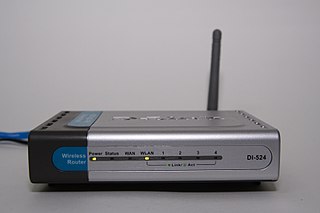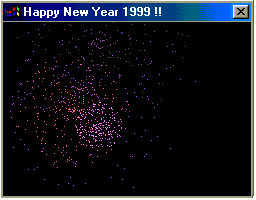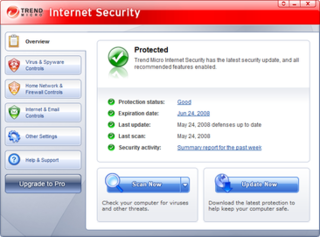
Spamming is the use of messaging systems to send multiple unsolicited messages (spam) to large numbers of recipients for the purpose of commercial advertising, non-commercial proselytizing, or any prohibited purpose, or simply repeatedly sending the same message to the same user. While the most widely recognized form of spam is email spam, the term is applied to similar abuses in other media: instant messaging spam, Usenet newsgroup spam, Web search engine spam, spam in blogs, wiki spam, online classified ads spam, mobile phone messaging spam, Internet forum spam, junk fax transmissions, social spam, spam mobile apps, television advertising and file sharing spam. It is named after Spam, a luncheon meat, by way of a Monty Python sketch about a restaurant that has Spam in almost every dish in which Vikings annoyingly sing "Spam" repeatedly.
Linksys Holdings, Inc., is an American brand of data networking hardware products mainly sold to home users and small businesses. It was founded in 1988 by the couple Victor and Janie Tsao, both Taiwanese immigrants to the United States. Linksys products include Wi-Fi routers, mesh Wi-Fi systems, Wifi extenders, access points, network switches, and Wi-Fi networking. It is headquartered in Irvine, California.

In computing, a zombie is a computer connected to the Internet that has been compromised by a hacker via a computer virus, computer worm, or trojan horse program and can be used to perform malicious tasks under the remote direction of the hacker. Zombie computers often coordinate together in a botnet controlled by the hacker, and are used for activities such as spreading e-mail spam and launching distributed denial-of-service attacks against web servers. Most victims are unaware that their computers have become zombies. The concept is similar to the zombie of Haitian Voodoo folklore, which refers to a corpse resurrected by a sorcerer via magic and enslaved to the sorcerer's commands, having no free will of its own. A coordinated DDoS attack by multiple botnet machines also resembles a "zombie horde attack", as depicted in fictional zombie films.

Trend Micro Inc. is an American-Japanese cyber security software company. The company has globally dispersed R&D in 16 locations across every continent excluding Antarctica. The company develops enterprise security software for servers, containers, and cloud computing environments, networks, and end points. Its cloud and virtualization security products provide automated security for customers of VMware, Amazon AWS, Microsoft Azure, and Google Cloud Platform.
Network security consists of the policies, processes and practices adopted to prevent, detect and monitor unauthorized access, misuse, modification, or denial of a computer network and network-accessible resources. Network security involves the authorization of access to data in a network, which is controlled by the network administrator. Users choose or are assigned an ID and password or other authenticating information that allows them access to information and programs within their authority. Network security covers a variety of computer networks, both public and private, that are used in everyday jobs: conducting transactions and communications among businesses, government agencies and individuals. Networks can be private, such as within a company, and others which might be open to public access. Network security is involved in organizations, enterprises, and other types of institutions. It does as its title explains: it secures the network, as well as protecting and overseeing operations being done. The most common and simple way of protecting a network resource is by assigning it a unique name and a corresponding password.

ClamAV (antivirus) is a free software, cross-platform antimalware toolkit able to detect many types of malware, including viruses. It was developed for Unix and has third party versions available for AIX, BSD, HP-UX, Linux, macOS, OpenVMS, OSF (Tru64), Solaris and Haiku. As of version 0.97.5, ClamAV builds and runs on Microsoft Windows. Both ClamAV and its updates are made available free of charge. One of its main uses is on mail servers as a server-side email virus scanner.
Norton Internet Security, developed by Symantec Corporation, is a discontinued computer program that provides malware protection and removal during a subscription period. It uses signatures and heuristics to identify viruses. Other features include a personal firewall, email spam filtering, and phishing protection. With the release of the 2015 line in summer 2014, Symantec officially retired Norton Internet Security after 14 years as the chief Norton product. It was superseded by Norton Security, a rechristened adaptation of the original Norton 360 security suite. The suite was once again rebranded to Norton 360 in 2019.

A wireless router or Wi-Fi router is a device that performs the functions of a router and also includes the functions of a wireless access point. It is used to provide access to the Internet or a private computer network. Depending on the manufacturer and model, it can function in a wired local area network, in a wireless-only LAN, or in a mixed wired and wireless network.
Barracuda Networks, Inc. is a company providing security, networking and storage products based on network appliances and cloud services.
Anti-spam appliances are software or hardware devices integrated with on-board software that implement e-mail spam filtering and/or anti-spam for instant messaging and are deployed at the gateway or in front of the mail server. They are normally driven by an operating system optimized for spam filtering. Anti-spam appliances have existed in wide area networks and home networks since the early 2000s.
Email spoofing is the creation of email messages with a forged sender address. The term applies to email purporting to be from an address which is not actually the sender's; mail sent in reply to that address may bounce or be delivered to an unrelated party whose identity has been faked. Disposable email address or "masked" email is a different topic, providing a masked email address that is not the user's normal address, which is not disclosed, but forwards mail sent to it to the user's real address.

OpenDNS is an American company providing Domain Name System (DNS) resolution services—with features such as phishing protection, optional content filtering, and DNS lookup in its DNS servers—and a cloud computing security product suite, Umbrella, designed to protect enterprise customers from malware, botnets, phishing, and targeted online attacks. The OpenDNS Global Network processes an estimated 100 billion DNS queries daily from 85 million users through 25 data centers worldwide.

The Linksys iPhone was a line of internet appliances from Cisco Systems. The first iPhone model—released by Infogear in 1998—combined the features of a regular phone and a web terminal. The company was later purchased by Cisco and no new products were marketed under the name between 2001 and 2006. At the end of 2006, Cisco rebranded its Linksys VoIP-based phones under the name, shortly before Apple released an iPhone of its own. This led to a trademark dispute between the two companies, which was resolved on February 20, 2007.

Belkin International, Inc., is an American consumer electronics company headquartered in El Segundo, California. It produces mobile and computer connectivity devices and peripherals for consumer and commercial use. These include wireless chargers, power banks, charging cables, data cables, audio and video adapters, headphones, earbuds, screen protectors and cases, surge protectors, docking stations and data hubs, secure KVM switches and network cables.

The Storm botnet or Storm Worm botnet was a remotely controlled network of "zombie" computers that had been linked by the Storm Worm, a Trojan horse spread through e-mail spam. At its height in September 2007, the Storm botnet was running on anywhere from 1 million to 50 million computer systems, and accounted for 8% of all malware on Microsoft Windows computers. It was first identified around January 2007, having been distributed by email with subjects such as "230 dead as storm batters Europe," giving it its well-known name. The botnet began to decline in late 2007, and by mid-2008 had been reduced to infecting about 85,000 computers, far less than it had infected a year earlier.

Sendio is a Newport Beach, California-based e-mail security company. The privately held company was founded in 2003 by Tal Golan, who currently serves as the company's president and CTO. By using Sender Address Verification technology, Sendio provides an e-mail security solution which stops spam, viruses, malware, phishing attacks and unsolicited e-mail from reaching the e-mail inbox. In February 2007, Sendio received $4 million in venture capital funding from Vicente Capital, Shepherd Ventures and Athenian Venture Partners. Former Microsoft CIO Rick Devenuti was appointed to the Board of Directors at Sendio in 2007.

Happy99 is a computer worm for Microsoft Windows. It first appeared in mid-January 1999, spreading through email and usenet. The worm installs itself and runs in the background of a victim's machine, without their knowledge. It is generally considered the first virus to propagate by email, and has served as a template for the creation of other self-propagating viruses. Happy99 has spread on multiple continents, including North America, Europe, and Asia.

Trend Micro Internet Security is an antivirus and online security program developed by Trend Micro for the consumer market. According to NSS Lab comparative analysis of software products for this market in 2014, Trend Micro Internet Security was fastest in responding to new internet threats, but as of June 2024 based on the chat support there is no known mechanism as with Microsoft Defender Antivirus to submit false positives like "Incorrectly detected as malware/malicious" or "Incorrectly detected as PUA " which may point to cutting corners and be the cause of application mislabeling e.g. as ransomware, while the mechanism for detecting real threats is not specified.
There is no commonly agreed single definition of “cybercrime”. It refers to illegal internet-mediated activities that often take place in global electronic networks. Cybercrime is "international" or "transnational" – there are ‘no cyber-borders between countries'. International cybercrimes often challenge the effectiveness of domestic and international law, and law enforcement. Because existing laws in many countries are not tailored to deal with cybercrime, criminals increasingly conduct crimes on the Internet in order to take advantages of the less severe punishments or difficulties of being traced.
Victor Tsao, or Ts'ao Ying-wei, is a Chinese American entrepreneur born in Taiwan and hardware engineer. Tsao and his wife Janie co-founded Linksys, a consumer home networking pioneer, and sold the company to Cisco Systems for $500 million in 2003.









